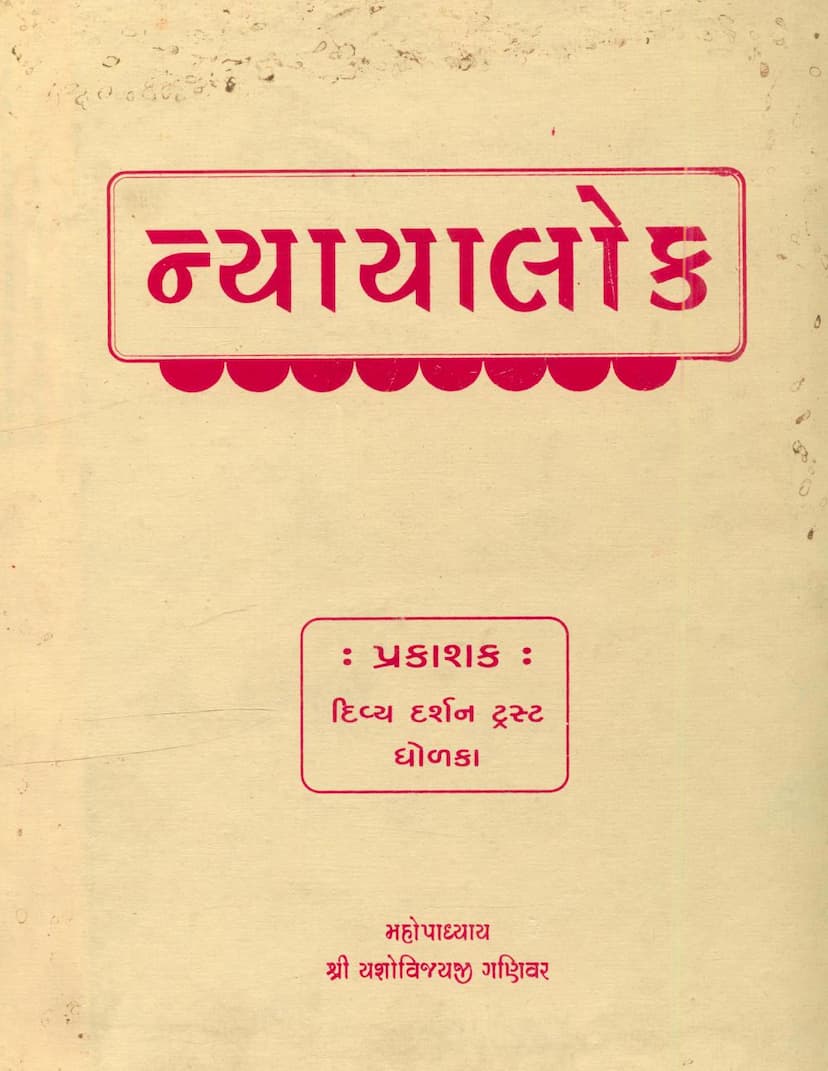Nyayalok
Added to library: September 2, 2025

Summary
This Jain text, titled "Nyayalok," authored by Yashovijay Gani and published by Divyadarshan Trust, is a complex philosophical and logical treatise within the Jain tradition. The provided text appears to be an introduction to the book, including a devotional tribute to a spiritual leader, acknowledgments, and detailed outlines of the book's content and arguments.
Here's a breakdown of the key themes and sections presented in the text:
1. Title and Authorship:
- Title: Nyayalok (ન્યાયાલોક)
- Author: Yashovijay Gani (મહોપાધ્યાય શ્રી યશોવિજય ગણિવર)
- Publisher: Divyadarshan Trust (દિવ્ય દર્શન ટ્રસ્ટ)
- Associated Texts: The book features a Sanskrit commentary titled "Bhanumati" (ભાનુમતી) and a Gujarati explanation called "Preetidayini" (પ્રીતિદાયિની), both authored by Muni Yashovijay, disciple of Pandit Ratikalyianvijayji.
2. Devotional and Acknowledgement Sections:
- Page 3 & 4: Feature a devotional poem ("Guru Guna Geet" - ગુરુગુણ ગીત) dedicated to Acharya Shrimad Vijay Bhuvan Bhanu Surishwarji Maharaj, praising his virtues and spiritual influence. It also includes acknowledgments to other spiritual leaders and institutions.
- Page 6 (Publisher's Note): The publisher expresses profound joy in releasing "Nyayalok" adorned with the Sanskrit commentary "Bhanumati" and the Gujarati explanation "Preetidayini," inspired by Acharya Bhuvan Bhanu Surishwarji Maharaj. They highlight the original work's intricate Navya Nyaya terminology as a barrier to study and express hope that these commentaries will make it accessible to a wider audience, enabling readers to understand Yashovijayji's other works. They also mention plans to publish a commentary on Haribhadrasuri's "Shodashak Granth."
3. Author's Introduction (Page 7 onwards):
- Critique of Literal Interpretation: The author, Yashovijay Gani, begins by emphasizing the danger of rigidly adhering to the literal meaning of scriptures, drawing a humorous analogy from a Christian priest's misinterpretation of biblical teachings. He stresses the importance of understanding the deeper layers of meaning: "Padarth" (meaning of terms), "Vakyarth" (meaning of sentences), and "Mahavakayarth" (meaning of major pronouncements).
- Importance of Logic and Inquiry: He cites various Jain and Indian philosophical texts (like Anuyogadwar Sutra, Sammatitarka, Yoga-drishti-samuchchaya) that advocate for the process of "chalan-pratyavastahan" (analysis and response) and the cultivation of intellectual virtues like "Uhapoha" (deliberation/reasoning) for acquiring true knowledge and avoiding "ashatana" (disrespect) towards scriptures.
- Role of Reason and Faith: The author states that pure faith is blind, and pure logic is lame. Only a balanced integration of both can lead to the realization of true dharma.
- Relevance of Nyaya Shastra: He underscores the critical importance of studying Nyaya Shastra (Indian logic) for refuting modern scientific theories (like counter-theory, Newton's law of gravity, Einstein's relativity) and internal philosophical challenges within Jainism (like Vipashyana, Nishchayabhasvad, etc.). It's also crucial for effectively refuting the critiques of Syadvada by Western philosophers like Harianna, Parmenides, etc.
4. Summary of Nyayalok's Content (Page 10 onwards): The book "Nyayalok" primarily discusses and critiques the philosophical principles of Gautamiya Nyaya (Navya Nyaya of Gangesha Upadhyaya) and Bauddha Nyaya (especially the Yogachara school). The work is divided into three "Prakash" (sections or lights):
-
Prakash 1 (Page 10 onwards): Mukti-vad (Liberation):
- Discusses the nature of liberation ("Mukti").
- Critiques the Naiyayika view of liberation as the destruction of suffering ("Duhkha Dhwans").
- Refutes the Naiyayika concept of soul ("Atma") as "vibhu" (all-pervading) and "Parimana" (having magnitude).
- Analyzes and critiques various other philosophical perspectives on liberation, including those of the Bauddhas, Sankhya, Vedanta, Mimamsa, and more.
- Critiques the Naiyayika definition of liberation as merely the destruction of suffering and discusses the role of knowledge, reason, and scripture in achieving it.
-
Prakash 2 (Page 11 onwards): Gyan (Knowledge) and Prakasha (Luminosity):
- This section delves into the nature of knowledge, critiquing Buddhist concepts like "Vijnanavada" (consciousness-only school) and "Kshanika-vada" (momentariness).
- Discusses the theory of "Svasamvedana" (self-luminosity of consciousness) and its implications.
- Analyzes the role of senses and their relationship with external objects and internal consciousness.
- Critiques the idea of "Para-prakasha" (external illumination of knowledge) and supports the Jain perspective of "Sva-prakasha" (self-luminosity of knowledge).
- Examines the concept of "Laukika Pratyaksha" (sensory perception) and its limitations.
-
Prakash 3 (Page 11 onwards): Six Substances (Dravyas) and Modes (Paryayas):
- This section provides a brief overview of the six fundamental substances in Jainism (Jiva, Pudgala, Dharma, Adharma, Akasha, Kala).
- It also discusses the nature of time ("Kala") and modes ("Paryaya"), including critiques of Digambara views on temporal atoms ("Kalanu").
5. Key Philosophical Debates Explored: The text engages with significant debates within Indian philosophy, primarily contrasting Jain logic and epistemology with the doctrines of:
- Nyaya (Gautamiya and Navya Nyaya): Particularly its theories on knowledge, inference, perception, liberation, and the nature of the soul.
- Buddhism (especially Yogachara and Momentariness): Critiques include "Vijnanavada" (mind-only or consciousness-only) and "Kshanika-vada" (momentariness).
- Mimamsa: Discusses views on liberation and the nature of knowledge.
- Samkhya: Critiques their concept of "Prakriti" and "Purusha."
- Vedanta: Engages with their philosophy of the soul and liberation.
- Charvaka (Materialism): Refutes their atheistic and materialistic viewpoints.
6. Author's Objective: Yashovijay Gani, through "Nyayalok," aims to provide a rigorous logical analysis of these various philosophical schools, establishing the superiority and correctness of Jain metaphysical and epistemological principles, particularly in the context of "Syadvada" (the Jain doctrine of manifold predication) and the nature of reality and liberation. He seeks to clarify complex logical arguments and terminologies, making them accessible for scholars and students of philosophy.
In essence, "Nyayalok" is a profound work of Jain logic and metaphysics that systematically dissects and critiques other philosophical systems, presenting the Jain viewpoint with sharp reasoning and extensive references to ancient texts.